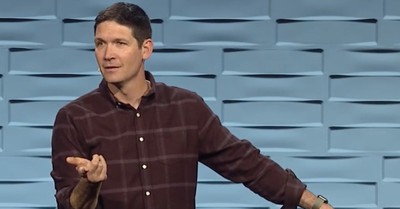Why Believers are Outpacing Secular Peers in Parenthood
According to new numbers from the Centers for Disease Control, America’s total fertility is at an all-time low, despite short-lived hopes of a post-pandemic bounce back. At just 1.62 births on average per woman, this means that more people are now dying each year than are being born.
In a panel discussion last week at The Catholic University, New York Times columnist Ross Douthat and authors Timothy Carney and Catherine Pakaluk explored the causes of the developed world’s looming “population bust.” Contributing factors are widespread contraception use, delayed marriage, careerism and self-expression, bad zoning laws, and even our obsession with pets. But one of the main causes is the sheer lack of support networks for modern parents. As David Brooks wrote in The Atlantic back in 2020, this Lone Ranger approach to family has made starting one much harder than it should be.
Once upon a time, married couples having children was the norm, an expected stage in life most people shared. Now, it is often treated as an exception—an individualistic consumer choice undertaken only by those with independent means and lots of free time.
Carney has compared the decision to have kids today to buying a boat. It’s an expensive and time-consuming hobby that friends, neighbors, and relatives feel no obligation to support. You chose to have a kid, goes the typical thinking. You’re on your own when it comes to storage and maintenance! Which is why the more individualistic we become, fewer people are choosing the pricey, high-commitment lifestyle required to bring the next generation into existence.
Yet one group of Americans has resisted this trend toward sub-replacement fertility and keeps stubbornly having kids. Writing at The Institute for Family Studies, sociologist Lyman Stone explains that total fertility among Americans who attend religious services weekly has never dropped below replacement for long, and actually increased in recent years.
It turns out that active participation in church or another faith community is strongly correlated with the decision to have more children than secular neighbors have. And when people drift away from weekly worship, they also become less likely to trouble themselves with tots.
The panelists in last week’s discussion offered several explanations for this link between faith and fertility. First and most obviously, Abrahamic religions teach that children are a blessing. As Pakaluk explained, to someone who believes the words of Genesis about people being made in God’s image, the infant born seconds ago has inherent value. He or she is precious apart from any instrumental benefit to parents or society and deserves to be welcomed and cherished simply for being human.
Religious faith can also provide a story in which our individual lives and the lives of our children make sense and have purpose. We’re taught in church that each of us has a calling beyond ourselves, what Pakaluk called “a lodestar” of life that justifies all the hard work and sacrifice necessary to raise a family.
By contrast, those without an active faith must invent their own story about existence. This apparent freedom of worldview, paradoxically, leads to pessimism about life. As Carney put it, “The secular story, the godless story, ends up being too sad to want to continue the human race.”
But as he argued in his recent book, Family Unfriendly, one of the biggest reasons religious people have more babies is practical: the support and solidarity parents get in church. He describes several countercultural enclaves of Christians and Jews who are intentionally family friendly, raising their children alongside one another, and assisting in the day-to-day tasks of parenthood. As a result of these decisions, borne out of strong convictions about the value of human life and the purpose of marriage, such communities reliably produce more children.
It turns out believing that babies aren’t boats is a powerful motivator to share the responsibility of parenthood, thereby making parenthood less daunting. In a time when most people look to the market or the government for all their needs, churches can and often do provide countercultural examples of communities centered on values, instead of consumption. As Pakuluk put it, dedicated believers are holding the key—maybe the only key—to reversing the birth dearth. For policymakers rightly concerned with this global challenge, that means being a friend to the faithful is a huge investment in the future.
It also means the faithful themselves are better positioned to inherit that future in many parts of the world. Children must, of course, grow up to retain and own their parents’ faith. They must be “born again.” But it’s fair to say being born in the first place is an important prerequisite—one that, for the most part, only believers are still achieving.
This Breakpoint was co-authored by Shane Morris. If you’re a fan of Breakpoint, leave a review on your favorite podcast app. For more resources to live like a Christian in this cultural moment, go to breakpoint.org.
Photo Credit: ©Pexels/August de Richelieu
Publish Date: May 16, 2024
The views expressed in this commentary do not necessarily reflect those of CrosswalkHeadlines.
BreakPoint is a program of the Colson Center for Christian Worldview. BreakPoint commentaries offer incisive content people can't find anywhere else; content that cuts through the fog of relativism and the news cycle with truth and compassion. Founded by Chuck Colson (1931 – 2012) in 1991 as a daily radio broadcast, BreakPoint provides a Christian perspective on today's news and trends. Today, you can get it in written and a variety of audio formats: on the web, the radio, or your favorite podcast app on the go.
John Stonestreet is President of the Colson Center for Christian Worldview, and radio host of BreakPoint, a daily national radio program providing thought-provoking commentaries on current events and life issues from a biblical worldview. John holds degrees from Trinity Evangelical Divinity School (IL) and Bryan College (TN), and is the co-author of Making Sense of Your World: A Biblical Worldview.



















